Social Welfare
Khelo Bharat Niti 2025
From Grassroots to Glory – Redefining India’s Sporting Future
Posted On:
10 JUL 2025 1:24PM
Key Takeaways
- Khelo Bharat Niti 2025: Integration with National Education Policy, promoting women empowerment, and engaging with the Indian diaspora.
- Olympics 2036: Aims to position India as global sporting powerhouse with the target to host Olympics in 2036.
- Budget Allocation: For FY 2025-2026, ₹3,794 crore is allocated to the Ministry of Youth Affairs and Sports —a 130.9% increase from FY 2014–15.
For people growing up three decades back, sports was a joyful escape, squeezed between school and homework. Playing cricket or football on dusty neighbourhood fields, dreaming of emulating heroes but never imagining sports as a viable career, was rather a common phenomenon. Back then, with limited sports infrastructure and a society that prioritized academics over athletics, sports were seen merely as a hobby.
Initially, sports in India lacked institutional focus, with minimal government support and a societal emphasis on academics over athletics. Sports and physical education were often viewed as extracurricular activities due to limited career prospects. However, over time, this changed through supportive government policies and interventions, providing grassroots training, scholarships, and infrastructure, thus transforming sports into an organized sector. These efforts culminated in the landmark Khelo Bharat Niti 2025. Programs like Khelo India have been pivotal, offering young athletes national youth leagues, advanced training facilities, and scholarships. These efforts have shifted perceptions, fostering a culture of encouragement and providing infrastructure, coaching, and career opportunities, enabling countless enthusiasts to pursue sports professionally with pride and ambition.
Khelo Bharat Niti – 2025 is a landmark initiative aimed at reshaping the country’s sporting landscape and empowering citizens through sports. It focuses on strengthening sports programmes from grassroots to elite levels, with mechanisms for early identification and nurturing of talent, promoting competitive leagues and competitions, and developing infrastructure in rural and urban areas. It also aims to build world-class systems for training, coaching, and holistic athlete support, while enhancing the capacity and governance of NSFs.
This policy aims to fundamentally transform the existing sports system.
- The policy aims to utilize sports for nation-building, economic growth, and social inclusion, in line with the Viksit Bharat vision.
- Aims to position India as a global sporting powerhouse with a strategic plan targeting excellence at the 2036 Olympics and building the case to host them, possibly.
- Promotes early talent identification, comprehensive athlete support, and the integration of sports science, medicine, and technology, which are essential for enhancing international performance.
- Highlights sports as a major economic driver by boosting sports tourism, attracting international events, and supporting sports startups.
- Encourages private sector investment via public-private partnerships (PPPs), corporate social responsibility (CSR), and creative funding approaches, laying the groundwork for a sustainable sports industry ecosystem.
- Promotes participation of women, marginalized groups, tribal communities, and people with disabilities, empowering them through sports.
- Positions sports as a viable career pathway via education integration and volunteerism.
- It aims to transform sports into a people’s movement through national campaigns, fitness indices in institutions, and community-level access, supporting a healthier population.
- Engaging with the Indian diaspora through sports.
- Integrating sports into the school curriculum as per the National Education Policy (NEP) 2020, while training and encouraging physical education and instilling lifelong fitness habits.
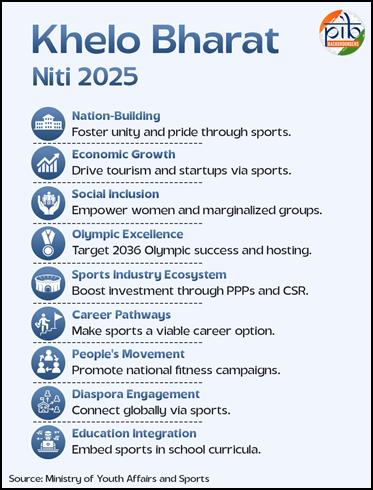
India, with 65% of its population under the age of 35, has the world’s largest youth demographic. For FY 2025–26, the government has allocated a record ₹3,794 crore to the Ministry of Youth Affairs and Sports —a 130.9% increase from FY 2014–15. Of this, ₹2,191 crore is designated for Central Sector Schemes, with ₹1,000 crore allocated to the Khelo India Programme, emphasizing the government’s strong focus on building India’s sporting future.
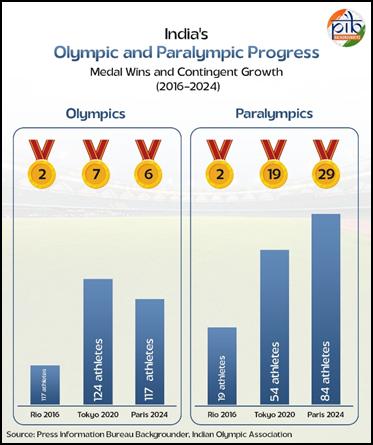
Over the years, India has won significant milestones at various areas in the sports field both domestically and on international levels.
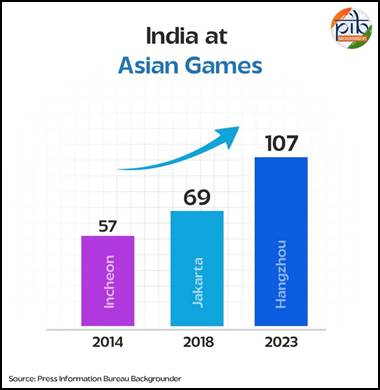
India’s remarkable sports milestones are a direct result of the Ministry of Youth Affairs and Sports’ robust initiatives, including schemes like Khelo India, the National Sports Development Fund, and targeted awards, fostering athlete development and infrastructure growth.
For instance, Khelo India is one of the flagship schemes by the Ministry of Youth Affairs and Sports with the budget allocation of ₹1,000 crore for FY 2025-2026.
Launched in 2016-17 and extended in 2021 with a ₹3,790.50 crore budget, the Khelo India programme promotes mass participation and sporting excellence across India. Key achievements include:
- Approval of 326 sports infrastructure projects worth ₹3,124.12 crore.
- Establishment of 1,045 Khelo India Centres (KICs) and 34 Khelo India State Centres of Excellence (KISCEs), with 306 accredited academies.
- Support for 2,845 Khelo India Athletes (KIAs) with training, equipment, medical care, and allowances.
The programme includes annual events like the Khelo India Youth Games (KIYG, started 2018, expanded to 27 sports by 2025), Khelo India University Games (KIUG), Khelo India Para Games, and Khelo India Winter Games (KIWG), with over 50,000 athletes participating across 17 editions. The Khelo India School Games, initiated in 2018, evolved into KIYG in 2019 with Indian Olympic Association (IOA) support. The 2023 and 2025 Para Games each saw over 1,300 athletes.

The Khelo India Rising Talent Identification (KIRTI) programme targets children aged 9-18, using 174 Talent Assessment Centres (TACs) for merit-based talent scouting. KIRTI aims to build a pipeline of athletes to position India among the top-10 sporting nations by 2036 and top-5 by 2047.
Additionally, the inaugural Khelo India Water Sports Festival is scheduled to take place at Srinagar’s Dal Lake from August 21–23, 2025, featuring five sports and over 400 athletes from across India. As the fifth Khelo India event of 2025, it aims to broaden sports participation, nurture emerging talent, and leverage advanced water sports facilities to prepare athletes for international competitions.
With a transformative vision for sports in India, the government has prioritized Sports education to foster a robust sports ecosystem, elevating athletics from a pastime to a professional career. The National Sports University, established in 2018 in Imphal, Manipur, is a dedicated institution for sports education in sciences, technology, management, and coaching, doubling as a national training hub for select disciplines by adopting global best practices through MoUs with universities like Canberra and Victoria. This institution focuses on advancing physical education, sports sciences, and elite training, aligning with national goals to nurture global talent. Guided by its motto, "Sports Excellence through Education, Research and Training," the university aims to lead globally in sports education, research, and training, fostering world-class athletes.
There are also several key schemes and awards that ensure continual governmental support for the identification and nurturing of talents:
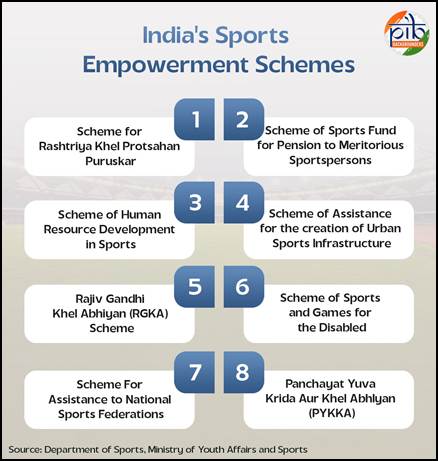
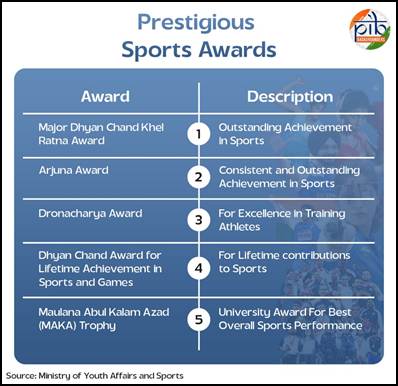
Journeys Beyond the Finish Line
Some of the endearing success stories of how sports schemes and initiatives have impacted lives continue to inspire, showcasing how sports, and particularly government schemes and support, have nurtured talent and enabled individuals to bring glory to India:
Recently, in a telephonic interview with the Press Information Bureau (PIB), para-athlete Rohit Kumar, based in New Delhi, expressed his gratitude to the Government of India for providing equal monetary rewards to medal-winning sportspersons, whether they are able-bodied athletes or para-athletes.
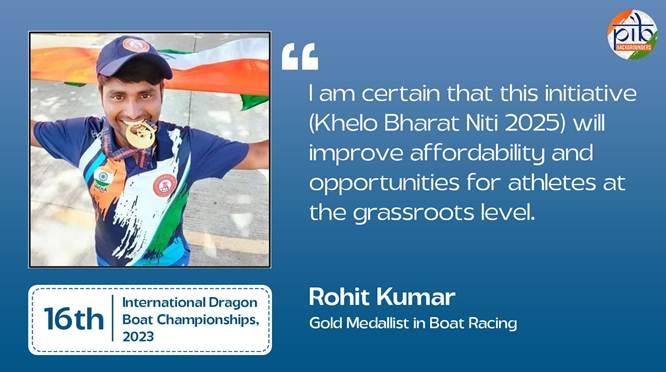
Kumar also mentioned that a scheme like Khelo Bharat Niti 2025 is pivotal to enable more athletes to succeed, as progress is only possible when supported by the government and society. The para-athlete, who is also a PhD research scholar in the Department of African Studies at the University of Delhi, emphasized that this scheme is a milestone because it is integrated with the National Education Policy, recognizing that education and sports are equally important for development. As a para-athlete and PhD scholar, he expressed hope that more individuals like himself will emerge in the future, breaking stereotypes and encouraging young people to pursue both education and sports simultaneously. Lastly, he again thanked the Government of India for implementing this scheme, noting that it is set to bring a revolutionary change in India’s sports culture, helping the nation rise on the global stage with more medals, greater glory, and increased participation.
Another notable contributor to the field of Indian sports is the Siddi community, descendants of Bantu peoples from East Africa, living in India for centuries. With immense support from the Government of India in recognition and nurturing of their talents, they have made distinguished contributions to sports, particularly in athletics, boxing, and judo.
Siddi athlete Samantha Saver Siddi, belonging to an ethnic community descended from India’s historic African diaspora, stated in a telephonic interview with the Press Information Bureau (PIB) that Khelo Bharat Niti 2025 is undoubtedly a milestone in the Indian sports landscape, and she is certain of its brilliant outcomes. Additionally, she mentioned about her regime highlighting that she practices in the morning and evening at the Jay Prakash Narayan Sports Academy in Bengaluru and, along with that, is pursuing her graduation in arts subjects, and also wants to win medals for India in the future.
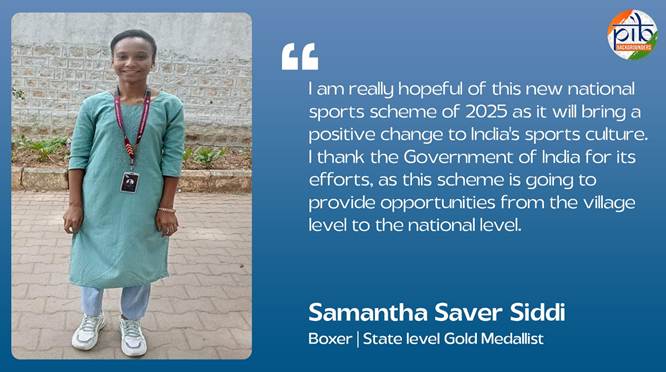
The Khelo Bharat Niti 2025, therefore, stands as a beacon of hope, revolutionizing India’s sports landscape by nurturing talent and fostering inclusivity across all levels. Through robust government support and innovative programs like Khelo India, it has paved the way for countless athletes to achieve global recognition and bring pride to the nation. This policy not only strengthens infrastructure and opportunities but also integrates sports with education, promoting a healthier and more ambitious youth. As India strides toward the 2036 Olympics, this initiative promises to cement its legacy as a sporting powerhouse.
References
Ministry of Youth Affairs and Sports
https://yas.gov.in/sports/schemes
https://yas.gov.in/sites/default/files/Khelo-Bharat-Niti-2025_0.pdf
https://yas.gov.in/
https://yas.gov.in/sports
Indian Olympic Association
https://olympic.ind.in/news-details/105
PIB Backgrounders
https://www.pib.gov.in/PressNoteDetails.aspx?NoteId=154601&ModuleId=3
PIB Press Releases
https://www.pib.gov.in/PressNoteDetails.aspx?NoteId=151806
PIB Factsheets
https://www.pib.gov.in/FactsheetDetails.aspx?Id=149107
https://www.pib.gov.in/FactsheetDetails.aspx?Id=148571
https://www.pib.gov.in/PressReleseDetailm.aspx?PRID=2079836
Click here to see in PDF
*****
RT/RK
(Explainer ID: 154856)
आगंतुक पटल : 7980
Provide suggestions / comments